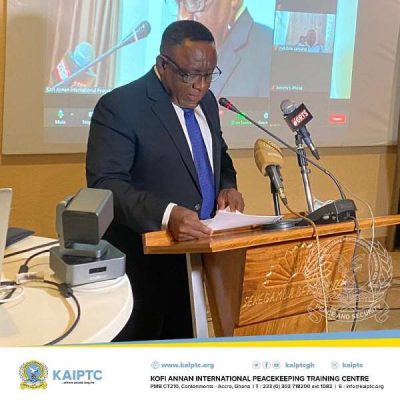Solicitor General of Gambia, Mr Hussein Thomasi has lamented that domestic prosecution of international crimes in Africa is quite problematic, hence e
Solicitor General of Gambia, Mr Hussein Thomasi has lamented that domestic prosecution of international crimes in Africa is quite problematic, hence effective prosecution at the domestic level requires qualified investigators and prosecutors as well as judges and most significantly an appropriate tribunal for the conduct of such prosecutions.
Though a number of countries have established mechanisms for the domestic prosecution of international crimes, he said there were still lapses.
He said Bosnia and the Democratic Republic of Congo have implemented some cases with success. We have also witnessed similar efforts in Cote D’Ivoire and Uganda with the establishment of the Ugandan International Crimes Division.
“These developments have very significant lessons to be learnt with the establishment and implementation of such mechanisms. Five years after its adoption in Malabo, the statute has not been ratified by any member State. Whilst the idea of the Malabo Protocol is laudable, we should be mindful of creating an impunity and accountability gap on the continent for international crimes,” he said.
He made these remarks in a speech he read on behalf of the Gambian Attorney General & Minister Of Justice, Mr. Dawda A. Jallow at the opening ceremony of the regional conference on domestication of atrocity prevention norms at the state level held on Monday, 21 June, 2021 at the Senegambia Hotel in Gambia.
According to Solicitor General Mr Hussein Thomasi, this conference has taken place at an appropriate moment when considerations are currently underway concerning the appropriate mechanism to deploy for the prosecution of crimes that have occurred given that most of the offences disclosed are not known under our criminal law.
Adding that adequate recommendation at the end of the conference will help the continent with the appropriate mechanism.
However, he noted that the Extraordinary African Chambers that was established by the African Union and the Government of Senegal tried and convicted Hissene Habre, former Chadian leader of international crimes. The Court was inaugurated in February 2013 with the mandate to try persons of international crimes committed in Chad from 7th June 1982 to 1st December 1990, the period when Hissene Habre ruled Chad.
Emphasising that, the Hissene Habre trial is a typical example of an African solution to an African problem.
“The trial of Hissene Habre has strengthened the case for a regional Court in Africa to deal with international crimes. A trial described in some quarters (New York times) as a milestone for justice in Africa”, he said.
Mr Serigne Ka, ECOWAS Commission Representative, in his goodwill message highlighted the importance of the conference, after the ECOWAS Mediation and Security Council meeting held on 15th June 2021 in Accra, which noted that the humanitarian situation in the ECOWAS region continues to look bleak, as the perennial conflicts in the region, including insurgencies, the persistent threat of terrorism in the “front-line” countries, the “farmers-herders” conflicts and communal clashes, continue to worsen the humanitarian situation.
In a nutshell, the situation of human security is not at its best in the region. Indeed, human and drug trafficking as well as the proliferation of small arms and light weapons continue to undermine the peace and security architecture of the region, adding to the mounting kidnapping incidents which remain a major security challenge in some Member States.
Meanwhile, the Gulf of Guinea has recorded the highest incidents of piracy and related maritime criminality in the world, whereas the developments in Mali, if not carefully and strategically handled, could add an aggravating element to the crisis facing the region.
“In view of the foregoing, the Responsibility to Protect, by both the ECOWAS Member States and the Commission cannot be overemphasised. In this regard, Articles 8 and 9 of the 2010 Monrovia Declaration on two decades of the peace process in West Africa stipulate that:
• ECOWAS must strengthen its capabilities to engage in the prevention, management and settlement of local conflicts of low intensity, by developing mechanisms to strengthen the regional architecture of peace and security;
• ECOWAS needs to strengthen the capacity of Member States to manage and resolve local conflicts of low intensity by developing national mechanisms to strengthen the national peace and security architecture”.
In this context, he explained that the ECOWAS Commission has refocused its early warning mechanism to take into consideration the concept of Human Security while working towards establishing the national early warning systems in each ECOWAS Member State.
On his part, the ambassador of Denmark to Ghana, His Excellency Tom Nørring in his address acknowledged the important contribution by the host government and the speaker, Solicitor General Mr Hussein Thomasi.
Saying, Gambia has set new standards by bringing the atrocities committed by the military in Myanmar before the International Court of Justice (ICJ).
“While this ICJ case for technical reasons is limited to the crime of genocide and to one specific victim group (that of the Rohingya), the lawsuit sends an important message about accountability”.
Concluding, he expressed his gratitude to the Kofi Annan International Peacekeeping Training Centre(KAIPTC) for organising such a conference and for their unflinching support to the Danish government in the area of peace and security.
COMMENTS